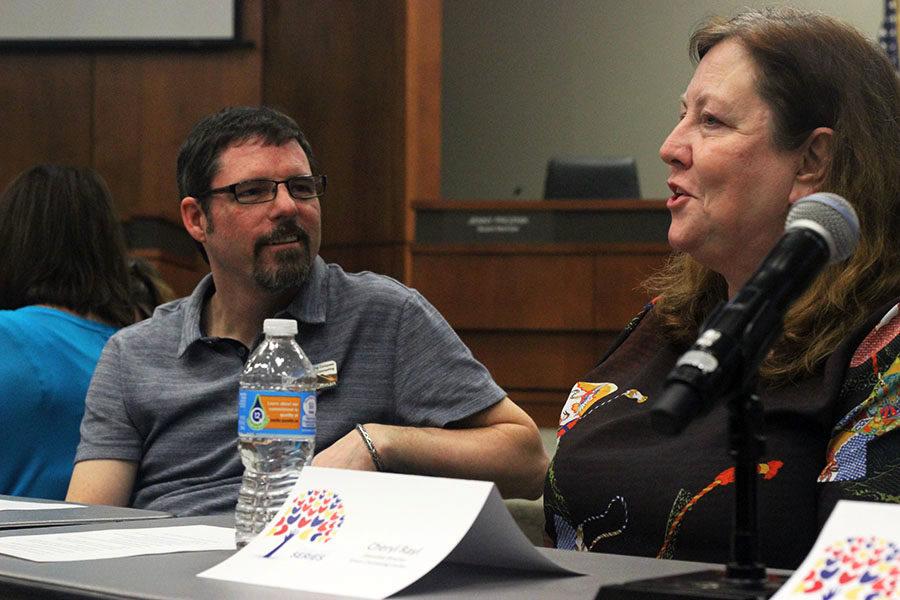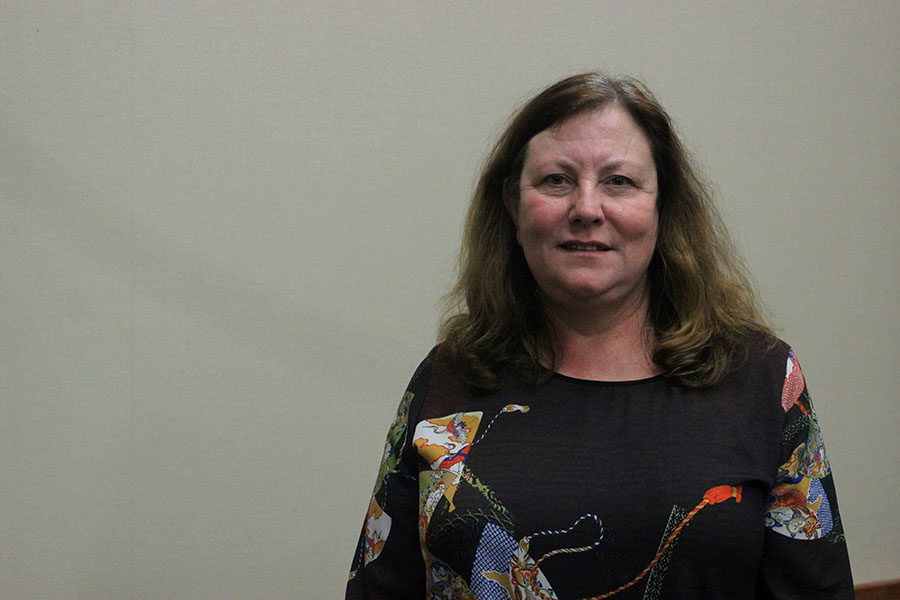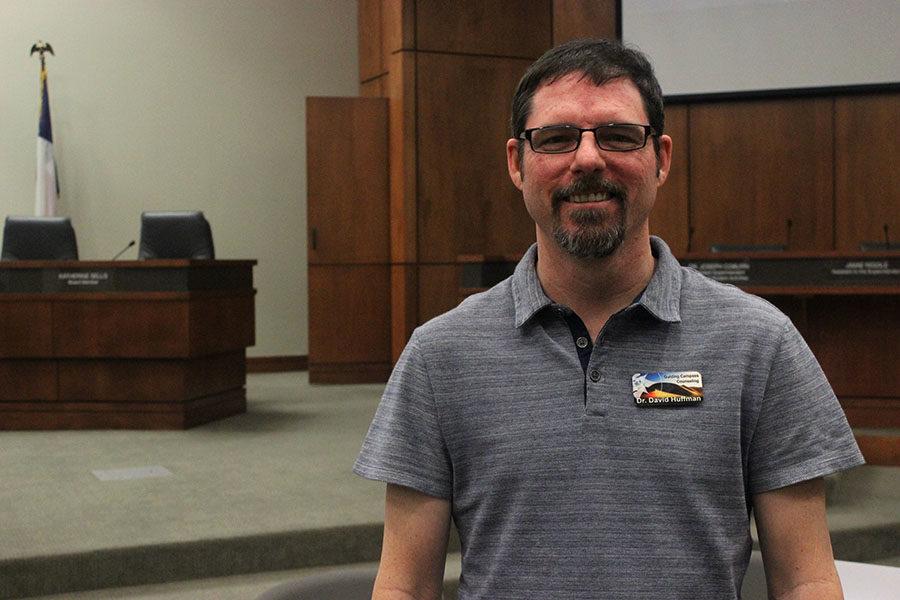Licensed therapist and supervisor David Huffman looks on while licensed professional counselor and supervisor Cheryl Rayl speaks to the audience during the first Whole Child Series panel on Tuesday, Feb. 28.
Healing hands behind Whole Child Series
April 10, 2017
From Grace with love
In the midst of fixing a car two men left a pan of gasoline next to the water heater inside their residence. They then abandoned the pan and at the same time their loving mother started walking outside toward them. Just as she made it out, the water heater exploded. But her grown autistic son was trapped inside the house. In an instant she ran back in and carried her son out of the fire and into safety. This lady was named Grace; she was the grandmother to LISD’s Whole Child Series panelist and licensed professional counselor and supervisor Cheryl Rayl.
“When [my grandmother] came out her legs were on fire,” Rayl said. “She couldn’t walk for a year. She would’ve done that for any of her kids or any person. She was just a really awesome person.”
Rayl’s grandmother was the same woman who in the middle of winter asked Rayl what she wanted for breakfast. When Grace received the peculiar response of fried fish, instead of dismissing the response and asking for something easier, she went out all bundled up and physically caught fish for young Rayl. She then fried the fish to perfection just the way Rayl liked them.
Her grandmother went on to be the inspiration for Rayl’s future counseling center, Grace Counseling.
In 2013, Rayl opened Grace Counseling with the intention of providing counseling to anyone who needed help for little to no money.
“I always said that when I retired I was going to open something like [Grace Counseling], and I was going to have interns and [I was] just going to take care of people who couldn’t afford counseling,” Rayl said.
Unfortunately, it wasn’t a “good business model” so Rayl hired counselors to help keep the center open. Along with licensed counselors, practicum students and interns work at the center to continue Rayl’s passion of helping people who can’t afford counseling.
“There is nobody that cannot afford to come here because I have somebody that can see them,” Rayl said. “A practicum student at the minimum, if they don’t have insurance.”
The center has expanded and today she has 17 counselors, three practicum students and three interns all located in Lewisville.
When she first went into college Rayl focused on engineering because of her family’s legacy in the profession.
“I’m a social worker at heart,” Rayl said. “I just had a hard time seeing myself that way because I grew up in a family that didn’t think counseling works. They kind of look down on that entire profession and so that’s something I’ve had to overcome.”
During her time as an engineering student, Rayl received a C on a test and started spiraling. The next thing she knew, she was suicidal. After being referred to a psychologist by the head of the department, she started seeing one. A few months after her first session, the psychologist convinced her to go into her lifelong passion: mental health.
Rayl graduated from Texas A&M in 1998 with a double bachelor’s degree in math and English and went on to receive a graduates degree in clinical psychology. Then her career launched.
“I started off as a therapist, then I was a marketing person and then I was a CEO,” Rayl said. “I ran hospitals for about 15 years and then I opened [Grace Counseling] then I quit [my CEO job] because it was too much to do both things. In my middle years making money was an important thing to me, but always in the back of my mind I wanted to get back to client services.”
She became passionate about helping youth, particularly those affected by schizophrenia. Her interest originated when she was in college studying the subject.
“When I was in school I was so fascinated by [the abnormal psycho] then I started working in a hospital where a lot of people had schizophrenia,” Rayl said.
Soon after, the disease touched home. Rayl’s son developed schizophrenia at 19 years old. Even though she had all of the training to spot it early, she didn’t see it coming.
“I didn’t know anyone [with the disease] personally, anyone in my family, anyone really,” Rayl said. “So when it first happened with him, I thought boy he’s gotten into some really bad drugs because he saying some things that are really bizarre.”
Her passion for not only schizophrenia but mental health in general heightened, and she became even more motivated to educate her community on the truth behind mental health.
“Mental [health] is exactly the same as physical health and everybody [is affected]; you’re not going to go through your life without having a cold,” Rayl said. “There is no way to separate the mental from the physical. Even the thoughts in your brain right now, they are physical manifestations. There are neurons being released, the neurotransmitters are going off in [your head].”
Her efforts to battle the misunderstandings of mental health and schizophrenia within her community have morphed from a frustration into a new motivation. She is pushed to help everyone win their own personal battles and to help heal communities after a loss. So when a suicide crisis happened close to home, Rayl and her team acted promptly.
Unfortunately another team was already in the process of helping heal the community. But LISD’s director of guidance and counseling services Monya Crow reached out to Rayl in hopes that she would participate as a panelist in the premiere of the district’s Whole Child Series.
“There was an outpouring of support and request for information and opportunities to have a community conversation about mental health and what support looks like,” Crow said. “The main goal [of the series] is to bring often stigmatized topic such as mental health and suicide out into the open.”
Rayl and others, including licensed therapist and supervisor David Huffman, were soon compiled into a panel consisting of mostly health care professionals and spoke about mental health in the younger generation. They encouraged parents to be familiar with the signs and warnings around potential suicide. The first meeting was Tuesday, Feb. 28.
“It’s a great opportunity to connect with the parents,” Rayl said. “Parents, a lot of times, are like the school handles what the school handles and we handle what we handle at home, and [then there’s] this disconnect.”
The district members and panelists hope to raise awareness within and beyond the community. As a whole, they are trying to inform the public on how to handle certain situations ranging from suicide to healthy diets.
“The most important part about the child series is that it began by connecting parents, teachers, students and therapists,” Huffman said. “[We’re all] coming together in one place and talking about children’s health and how we can best support our children and our community and thinking of it like a collective experience.”
Rayl wishes to not only heal hurting communities but people hurting everywhere. Her passion and drive alone push her to combat the stigmas placed upon mental health.
“I think seeing people change is so gratifying,” Rayl said. “I feel like it gives me purpose.”
From pastor to passion
He has always had a passion for helping people, especially youth. At the start of his career he graduated from the Brite Divinity School at Texas Christian University with a Master of Divinity degree. He thought he had found his lifelong mission and began working with various ministries and nonprofit organizations. However, it felt out of place so 15 years later David Huffman found himself attending the University of North Texas to become a therapist where he finally found a sense of belonging.
“In every place I found myself most enjoying the moments when I could sit down with another person and really make a personal connection and understand them and help them find the right path,” licensed professional counselor and supervisor Huffman said.
It wasn’t until after attending counseling himself when he realized his true passion in life and made the decision to change his career to pursue helping others more directly.
“I’m passionate because of my own life,” Huffman said. “Probably one of the biggest things was exploring my own thoughts and feelings, and in the process be understood by another person for exactly who I was. Through joy and pain [I realized] I could come out the other side with more self acceptance, satisfaction and confidence with my life.”
Huffman took this into consideration when he finally opened his own practice, with an end goal of being accessible to people of all backgrounds.
“When we opened Guiding Compass, we knew we wanted to be available to the community,” Huffman said. “I think often times when parents see their children struggling they don’t know where to start and we enjoy being a place where parents can come and learn more.”
In addition to being a certified licensed professional counselor supervisor, Huffman is also one of LISD’s Whole Child Series panelists and an adjunct professor at UNT. Other than his many roles in the community, he is a husband of 17 years to his wife and has two Cocker Spaniels named Oscar and Lucy who he cherishes deeply.
“[My wife and I] like to do fun things together, go out to dinner and we do a date night every week as kind of our way of carving out time together,” Huffman said. “We’re dog people. Our dogs are our children, and so we love doing fun things with them and taking them out.”
When he is not hanging out with his wife and dogs or juggling his active roles in the local community, Huffman is also part of a small band making use of his guitar skills that he developed at age 6.
“Music is really a big part of my life, so playing in my band is awesome,” Huffman said. “Oddly enough [the band is] called Good Therapy. It’s not made up of all counselors though, I’m the only counselor. I play guitar and I sing. We do a lot of vocal harmony, rock and pop, blues and folk and tons of different stuff. We play around town; it’s a blast.”
In his professional career as a therapist, Huffman has a special certification in play therapy. Therapeutic play is a specialized form of counseling that allows therapists to utilize play as the primary language of communication for younger children and helps express their emotions how they would naturally. Huffman is adamant about the benefits of this form of therapy for youth as it helps improve communication and explores emotions.
“Often times words are hard to describe feelings [for youth], so I like to use activities or art or music or sometimes just talking,” Huffman said. “I like working in a way each person is most comfortable.”
Huffman focuses more on his play techniques to develop relationships with his younger clients, but like most therapists, he adapts his counseling techniques to best suit his clients. For other clients who fall into the category of preteens and teenagers, Huffman incorporates both talking and artistic activities.
“I think the most important thing that I do is the relationship I develop with each one of my clients,” Huffman said. “It’s the foundation of growth. If I have a strong relationship with my client [then] they are more likely to feel safe to be themselves with me and be honest and that’s when growth happens.”
While therapists must balance their professional roles as their client’s counselors, Huffman finds he is not immune to the influences his clients often have.
“Every person I meet impacts me and I learn from them and I expand the way I see the world, ” Huffman said. “When you’re a counselor if you stop growing then you’re going to stop being effective.”
Although Huffman impacts his clients and community with his active involvement at the Guiding Compass, he has a larger life goal of impacting the entire community beyond just his clients.
So when LISD’s director of guidance and counseling services Monya Crow contacted Huffman with the hopes that he would have time to partake in the the district’s Whole Child Series as a panelist, Huffman was more than willing to take on the new role.
“The series was born from several student loses this year,” Crow said. “I hope that as a community we continue the conversations. Whatever our students are experiencing, I hope that we keep talking, keep supporting and keep seeking solutions.”
Keeping true to one of his biggest goals, Huffman took on the opportunity to help his community on Tuesday, Feb. 28 as one of several panelists, including licensed therapist Cheryl Rayl, discussing mental health among the youth of the community.
“I wish that conversation [about mental health and suicide] would go on more often, and when I saw it was going to happen I knew it was important to be a part of the conversations,” Huffman said.
The district’s Whole Child Series’ main goal is to bring awareness to the importance of mental health both within the immediate and larger community. Each panelist brings their own knowledge to inform the community about the proper ways to approach mental health.
“Listening is the most important part,” licensed professional counselor and supervisor Cheryl Rayl said. “[People need] someone that’s not judging them, that’s not involved with the problem. A lot of time people will figure out just by talking [out] their own answers.”
Huffman hopes to help improve the stigma of mental health within the community by sharing his expertise with others. His love for strong relationships and guiding youth continues to motivate him to help the younger generations of the community.
“I am finally at the point where I’m finally doing what I was made to do,” Huffman said. “I have a real passion for this.”



